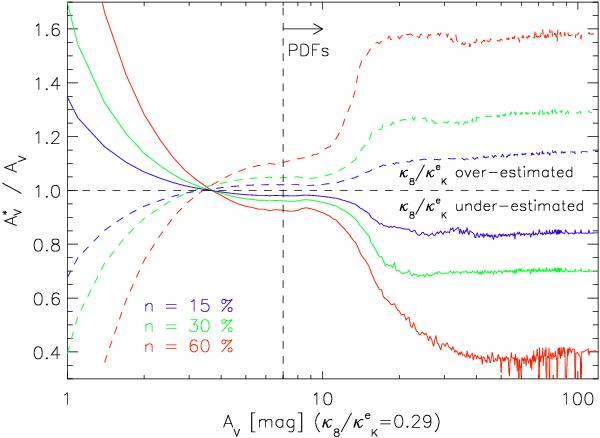Fig. C.1

Response of the column densities derived using the combined NIR+MIR technique to
the adopted NIR-to-MIR opacity-law. The curves show the ratio of column densities
derived with alternative opacity-laws ( ) to the one adopted in
this paper (
) to the one adopted in
this paper ( ). The curves were
calculated by keeping the NIR opacity fixed and by changing the relative MIR
opacity. The solid blue, green, and red curves show the case in which the true
opacity-law is 15%, 30%, and 60% higher than the adopted value
(
). The curves were
calculated by keeping the NIR opacity fixed and by changing the relative MIR
opacity. The solid blue, green, and red curves show the case in which the true
opacity-law is 15%, 30%, and 60% higher than the adopted value
( ). The dashed
curves show the corresponding curves for the cases in which the ratio is lower. At
AV ≲ 10 mag the technique relies dominantly on the
NIR data, and therefore the changes in MIR opacity do not greatly affect the
column density. The large-scale background component that is filtered out by the
MIR data (and assumed to be recovered by the NIR data) has its maximum at
AV = 10−20 mag. Thus, at that range there is a
transition from NIR-dominated to MIR-dominated regime. Finally at
AV ≳ 20 mag the large-scale column density component
starts to be small compared to the total column density, and thus the ratio
approaches the value by which the original opacity law was modified (i.e., factors
1.15, 1.3, and 1.6). At extinctions lower than the 10 mag threshold value, there
is a small bias in the extinctions. It is caused by the fact that the background
correction value (see Sect. 3.1) for some
pixels can result from interpolation from neighboring pixels instead of from the
difference of the NIR and MIR extinctions. The pixels for which this interpolation
is performed are not necessarily the same in the cases where
n = 1 and n ≠ 1.
). The dashed
curves show the corresponding curves for the cases in which the ratio is lower. At
AV ≲ 10 mag the technique relies dominantly on the
NIR data, and therefore the changes in MIR opacity do not greatly affect the
column density. The large-scale background component that is filtered out by the
MIR data (and assumed to be recovered by the NIR data) has its maximum at
AV = 10−20 mag. Thus, at that range there is a
transition from NIR-dominated to MIR-dominated regime. Finally at
AV ≳ 20 mag the large-scale column density component
starts to be small compared to the total column density, and thus the ratio
approaches the value by which the original opacity law was modified (i.e., factors
1.15, 1.3, and 1.6). At extinctions lower than the 10 mag threshold value, there
is a small bias in the extinctions. It is caused by the fact that the background
correction value (see Sect. 3.1) for some
pixels can result from interpolation from neighboring pixels instead of from the
difference of the NIR and MIR extinctions. The pixels for which this interpolation
is performed are not necessarily the same in the cases where
n = 1 and n ≠ 1.
Current usage metrics show cumulative count of Article Views (full-text article views including HTML views, PDF and ePub downloads, according to the available data) and Abstracts Views on Vision4Press platform.
Data correspond to usage on the plateform after 2015. The current usage metrics is available 48-96 hours after online publication and is updated daily on week days.
Initial download of the metrics may take a while.


